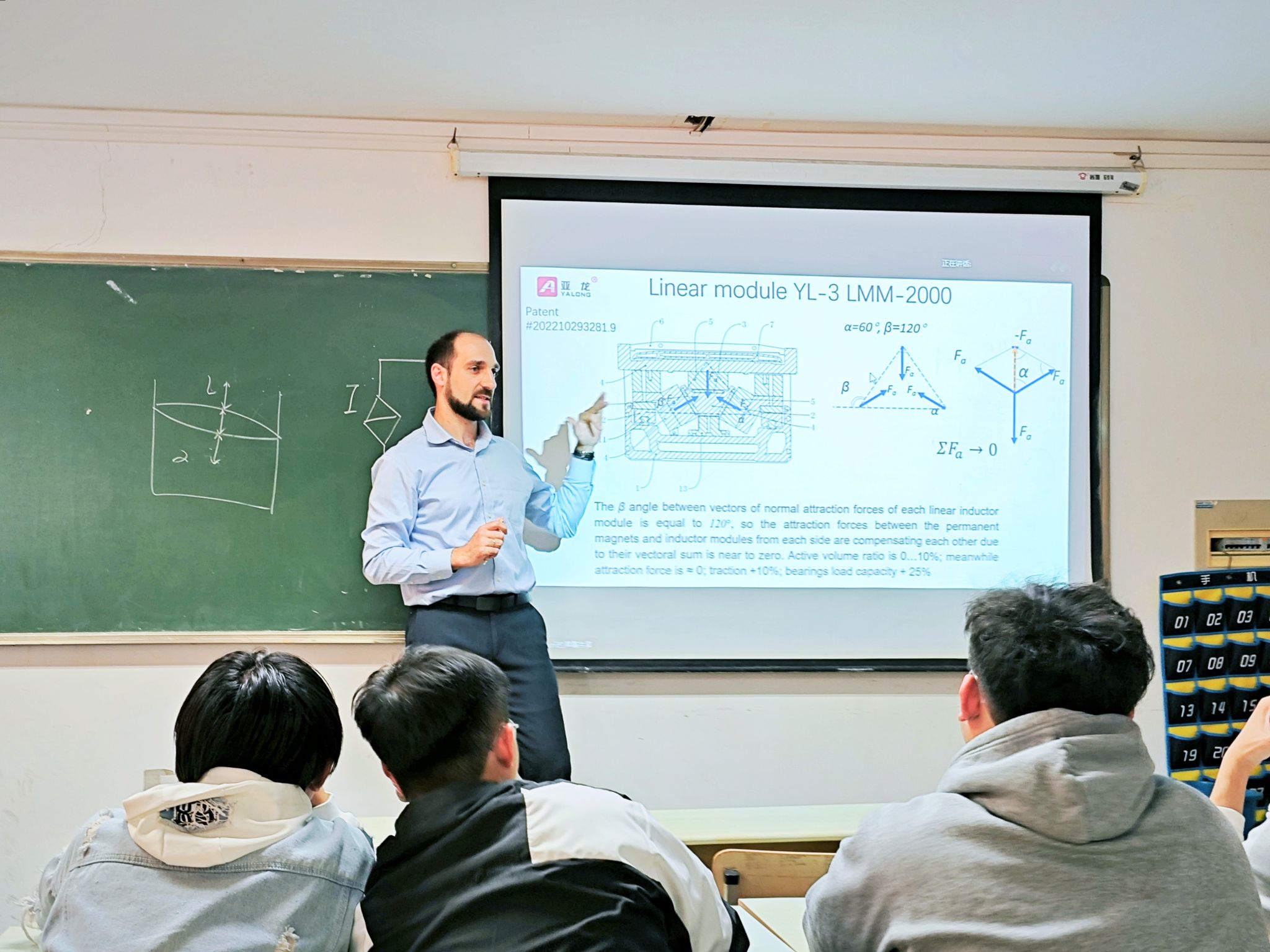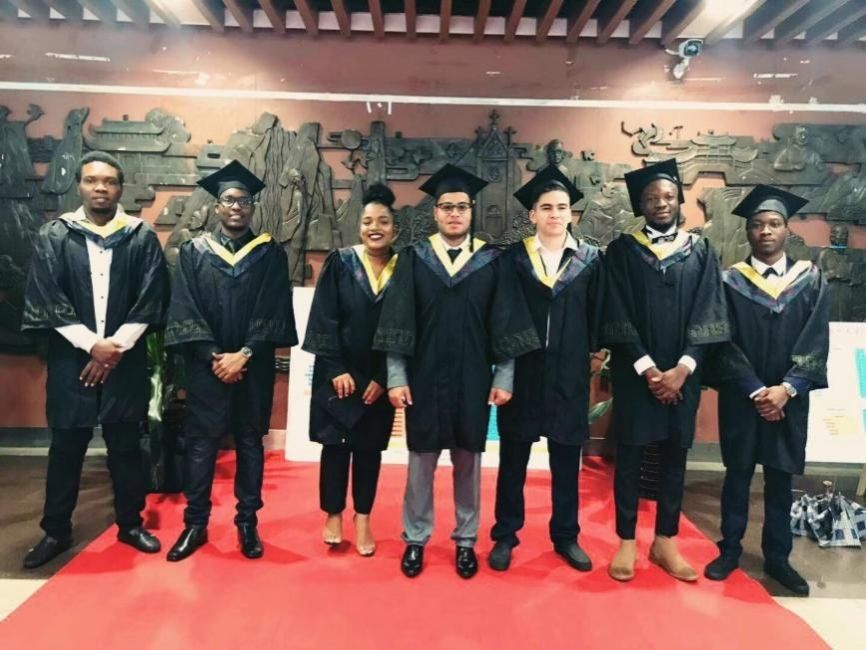Mar 24, 2025
Profile
The Mechanical Engineering (International) in Wenzhou University is constructed in accordance with international standard requirements of the Washington Accord (http://www.washingtonaccord.org/). And in terms of the international engineering education concept, the CDIO (Conceive、Design、Implement、Operate) project teaching mode is adopted to cultivate talents. Currently, there are three major modules of industrial automation, laser processing and robot. This major is dedicated to train mechanical engineers with world-class professional skills, cross-cultural understanding and global communication skills for satisfying great needs for international engineering talents.
Teaching Language:English
Job Prospect
Our graduates are involved in mechanical design and manufacturing, technical innovation, applied research, project management, sales and marketing, etc.
Main Orientations of Graduates Employment:
▲ To businesses: mechanical design engineer, industrial robot application engineer, equipment engineer, mechanical process engineer, mold engineer, CNC engineer, product engineer, technical sales and management engineer;
▲ To universities or scientific research institutions: Teacher and researcher;
▲ International civil servant in the government;
▲ University graduate student.
Core Courses
Course Name:Engineering Graphics
Course Description:
Engineering Graphics is an applied science that studies the drawing, expression and reading of engineering drawings. It is the technical language that engineering and technical personnel abide by in the process of design, manufacturing, and maintenance. The engineering Graphics course mainly studies the basic principles and methods of drawing and reading engineering drawings, and cultivates students' spatial imagination. It is a basic technical course with both systematic theory and strong practicality.
Course Name:Mechanical Design
Course Description:
This course focuses on the working principles and simple design methods of commonly used mechanisms and components, the principles of mechanism selection and component strength calculation and structural design, and the thinking methods of innovative design. After graduation, whether the students are engaged in mechanical product design or as equipment management and operation work, the course provides the basic knowledge necessary for common mechanisms, general components and transmission principles, equipment maintenance and fault analysis. Through the study of this course and the subsequent course design practice, students can be trained to initially have the ability to design general mechanical transmission devices, laying a solid foundation for future creative activities.
Course Name:The Basics of Engineering Materials and Forming Technology
Course Description:
This course is a comprehensive course involving blank material selection and forming methods and other professional knowledge. This course is the core course for the major of mechanical design and manufacturing, as well as the link between the basic and professional courses of the major, and establishes the foundation for students to learn follow-up professional courses and participate in professional practice.
Students are meant to learn the basic knowledge of engineering materials and forming technology, master the reasonable selection of commonly used mechanical parts and blank manufacturing methods, and develop the corresponding process route. Meanwhile, the engineering application ability can be improved through the study of the course.
Course Name:International Trade
Course Description:
International trade is a discipline of applied economics, which mainly studies international trade theory and policy, international business management, international business and global marketing, international trade risk analysis and avoidance, in addition, it also provides theoretical basis and analytical means for senior managers of enterprises to formulate international business strategies and relevant government departments to formulate international trade policies. Students studied this course should systematically master the basic theories of international economy and international trade, master the basic knowledge and basic skills of international trade, understand the development status of contemporary international economy and trade, and be familiar with the prevailing rules and practices of international trade.
Course Name:Engineering Economic
Course Description:
Engineering economics, also known as cost-benefit analysis, is a new subject developed in recent years. It is a scientific evaluation system to study how to make engineering technology programs (or investment projects) achieve the best economic results. Engineering economics usually takes engineering project as the research object. It has following characteristics:
1. Engineering economics emphasizes economic analysis on the basis of technical feasibility.
2. The economic analysis and evaluation of engineering technology are closely related to the objective environment.
3. Engineering economics is the science of analyzing and comparing the economic effects of the future "differences" of the feasible schemes of new technologies.
4. Almost all economic effects discussed in engineering economics are related to the "future".
Course Name:Engineering Project Management
Course Description:
Engineering project management is an important course closely related to engineering management practice. Through the study of engineering project management theory and management method, combined with the analysis of some engineering project management cases, students' ability should be improved such as the ability to independently use engineering project management theory and management method to solve engineering project management problems. To lay a solid foundation for students to engage in relevant engineering construction management work after graduation.
After learning, students are required to initially understand the theories, methods and means of decision-making, planning, organization, command, control and coordination of engineering projects, and master the main ideas, methods and management contents of engineering project management, including the methods of planning, organization, command and control, etc.
Course Name:Digital Image Processing
Course Description:
Digital image processing is a method and technology to remove noise, enhance, restore, segment and extract features from images by computer. It is widely used in industry, agriculture, environmental protection, military, medicine and so on. The processing of the image mainly has the following purposes:
1. Improve the visual quality of the image, such as image brightness, color change, enhancement, suppression and so on.
2. Extract some features or special information in the image, such as frequency domain, gray level, color, boundary and other feature information.
3. Image data transformation, encoding and compression for image storage and transmission.
Course Name:Robotics
Course Description:
Robotics is not only an important course in the field of modern education, but also a multi-disciplinary comprehensive course. It involves the sensing, cognition, machine driving and other aspects of knowledge. It can cultivate students' creativity, imagination and ability to solve practical problems. In addition, the course plays a key role in increasing students' interest in science, mathematics and engineering. The related knowledge will be taught such as computer vision, computer control, automatic control principles, etc. It is a course that require knowledge from many fields, yet it is a fun course and students should learn much from it. This course also lays a solid foundation for future career development in various fields.
Course Name:3D printing
Course Description:
3D printing technology is a rapid prototyping technology, also known as additive manufacturing. This technique is based on a digital model file, using an adhesive material such as powdered metal or plastic, by printing layer by layer to construct the object. During the study of the course, students may learn the following aspects
l 3D Modeling: Learn how to create digital models using 3D modeling software, which is the foundation of 3D printing.
l Principles of 3D printing: Gain an in-depth understanding of how 3D printing works and different types of technologies
l Materials Science: Understand the different 3D printing materials and their properties, including plastics, metals, ceramics, etc.
Application fields: Explore the application of 3D printing technology in different fields, such as medical, construction, jewelry, automobiles, etc.
Course Name:Internet Of Things Technology and Its Application
Course Description:
It is a course that introduces the formation, development, application and future trend of Internet of Things technology. It mainly involves the basic concepts, architecture, related technologies and application scenarios of the Internet of Things.
Specifically, the course may include the following:
Basic concepts and architecture of the Internet of Things: Introduce the definition, development history, architecture and technical architecture of the Internet of Things.
Related technologies of the Internet of Things: including sensor technology, wireless communication technology, network protocols, data fusion and processing, cloud computing and big data technology.
Through the study of this course, students can understand the basic concepts and architecture of the Internet of Things, master related technologies and application scenarios, and lay a solid foundation for future career development or further research on the Internet of Things.




